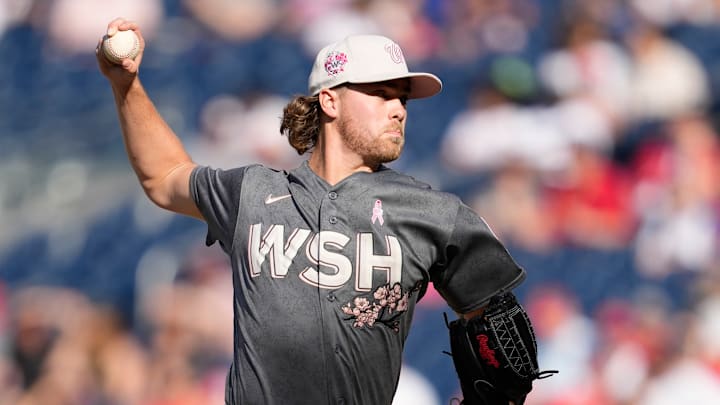Raise your hand if you thought Jake Irvin would be in the big leagues this early in the season.
When Chad Kuhl landed on the 15-day injured list due to a foot injury, Washington promoted the 26-year-old, right-handed Irvin from Triple-A Rochester. So far, the 6-foot-6 hurler has looked like he belongs.
Expectations from the outside weren't particularly high for Irvin ahead of his debut. Few Nationals starting pitchers in recent memory have had successful debuts in the majors, and many of them came with significantly higher profiles.
Although he'd had success in each of his minor league seasons prior to 2023, Irvin was facing a 5.64 ERA through five starts in Rochester prior to his promotion. He's also only a modest prospect (No. 19 overall, per MLB Pipeline) in the Nationals system and is just two years removed from Tommy John surgery.
And yet, the 2018 fourth-round draft pick from Oklahoma (the same school that produced Cade Cavalli and ascending pitching prospect Jake Bennett) has held his own so far. He allowed one run over 4 1/3 innings in his first start on May 3, and then followed it up with a scoreless appearance in which his lasted into the seventh inning.
His most recent outing was less favorable, but all six of the runs he allowed came in his fifth and final inning on the mound - and some of them scored after he had left the game. In a "what have you done for me lately" environment, no one should feel discouraged by this one hiccup.
Through 15 1/3 big league innings, Irvin has struck out 14 batters and allowed only 12 hits, both of which are solid. The biggest issue he's battled thus far is walks - he's surrendered eight of them. By in large, that's because he's only established two successful pitches so far at this level.
What's strange is that his fastball - which earned a 60 grade (which is very good) on his prospect profile and tops out at 97 miles per hour - has been obliterated. His four-seamer and sinker have both averaged around 93 miles per hour and produced expected slugging percentages above .500, which is roughly the equivalent of an All Star hitter.
On the other hand, whereas there was belief that he lacked secondary stuff in his arsenal, his curveball and changeup have both been very successful pitches for Irvin in the majors. If he can sustain anything close to the level of success he's had with those two pitches and can improve his fastball, he'd be more than qualified to stay in the starting rotation.
Still, that's largely hypothetical. How realistic is it to expect that kind of improvement? After all, he's not exactly a bonafide prospect. Maybe this is all he is, or maybe he'll be worse once big league hitters adjust to his stuff.
Here's the reality of the situation: Chad Kuhl - even once he's available to pitch against - isn't particularly stiff competition, and there's no one else that currently deserves a crack at the No. 5 starter role.
To that end, Kuhl has thrown a pair of simulated games as he begins his return to big league action. He's had a rough start to his season, though, and doesn't present the long-term upside that a rookie like Irvin does.
Given the state of this team, in the thick of a rebuild, the youth of Irvin has to win out - as long as he continues to look competent. He may end up being a bullpen arm down the road, but for now, he's worth a look in the rotation.
Barring the unforeseen, Irvin will be back on the mound Friday night at home against the Detroit Tigers. That will serve as an opportunity to bounce back against a lineup that is far from daunting.
